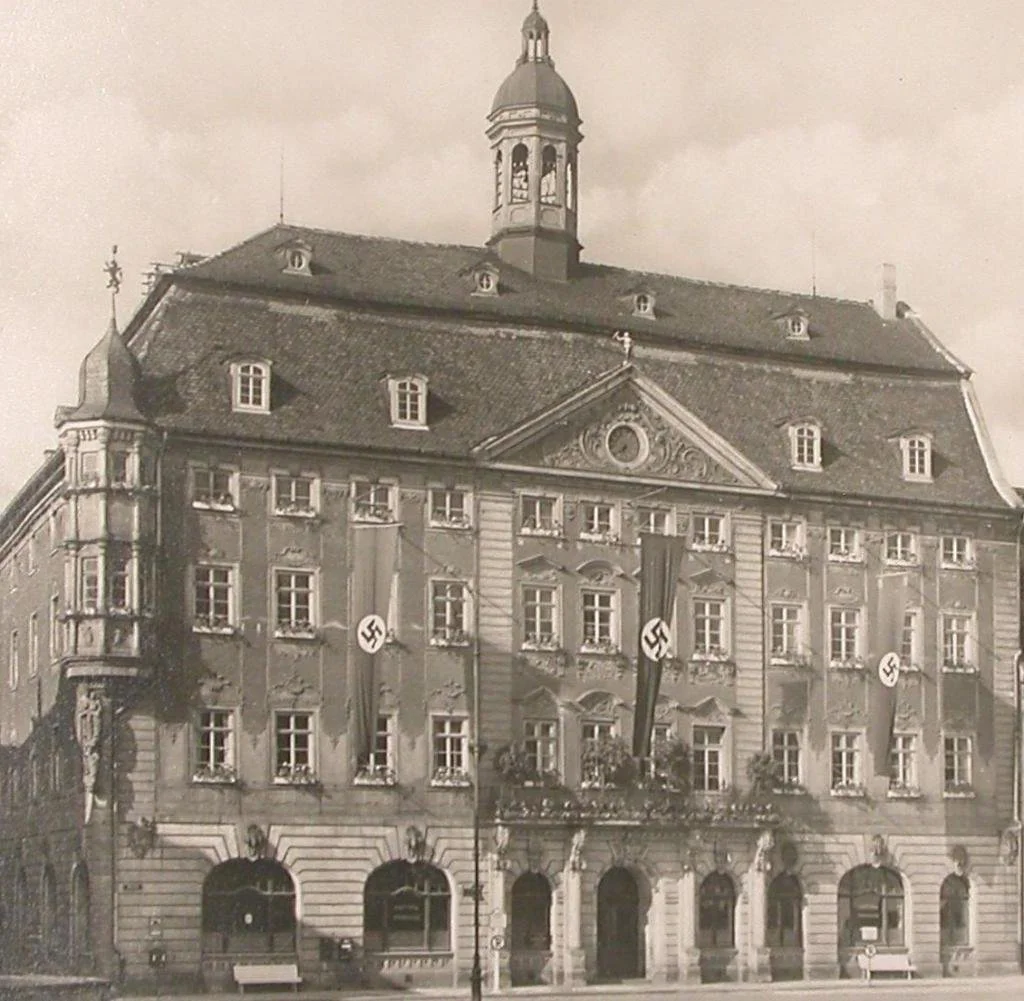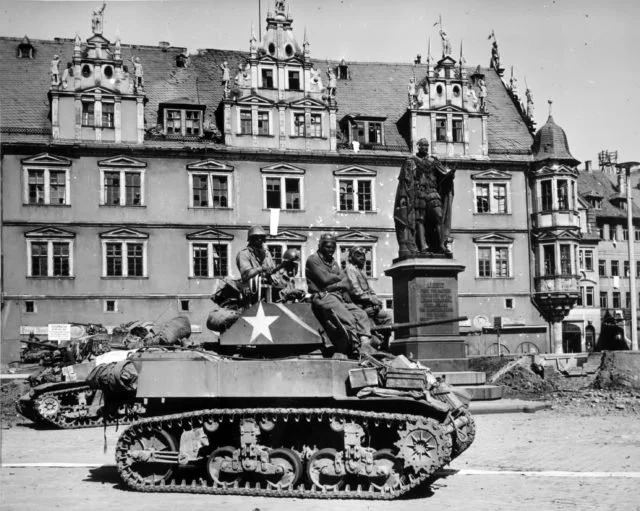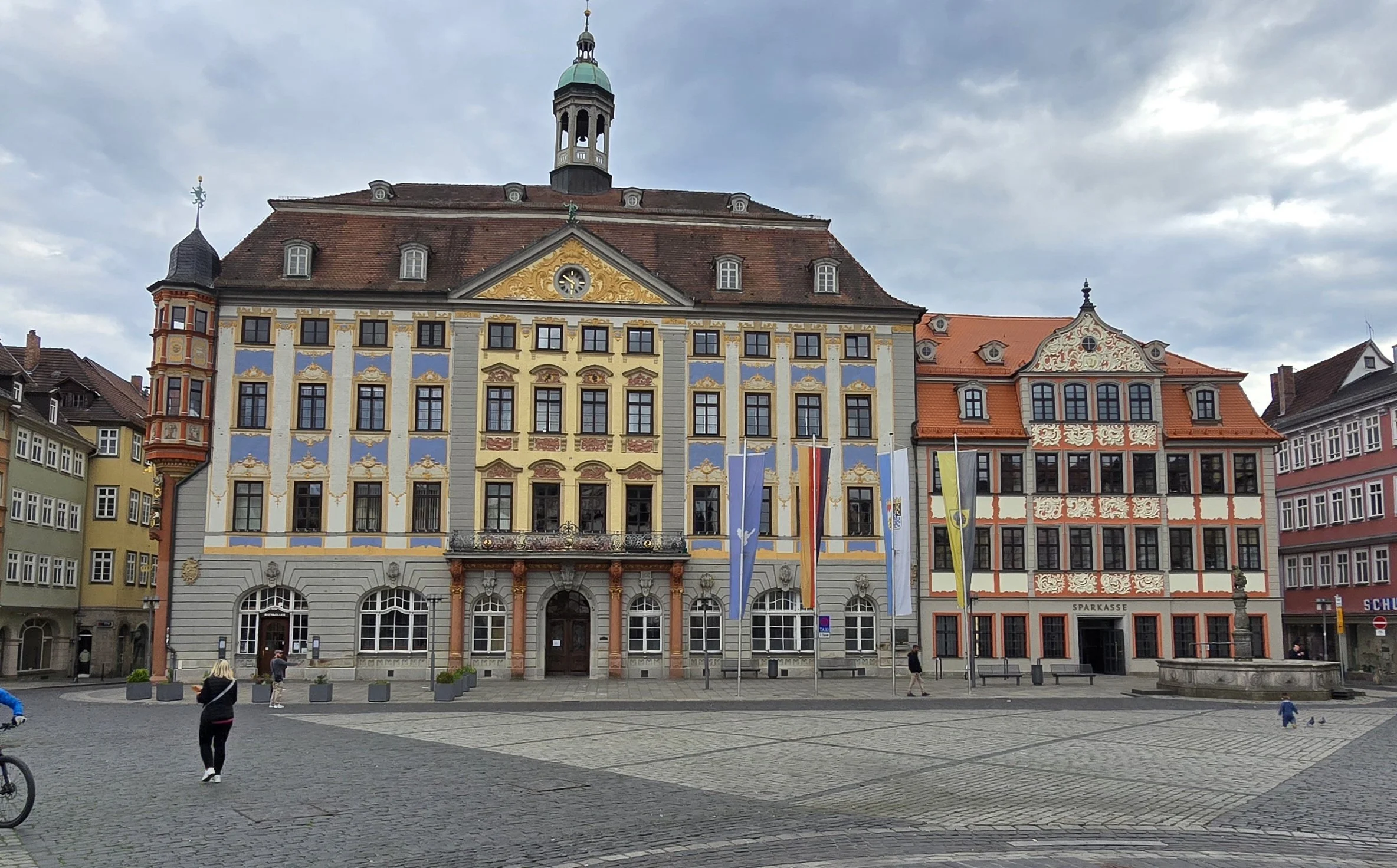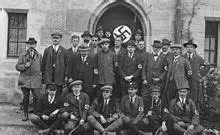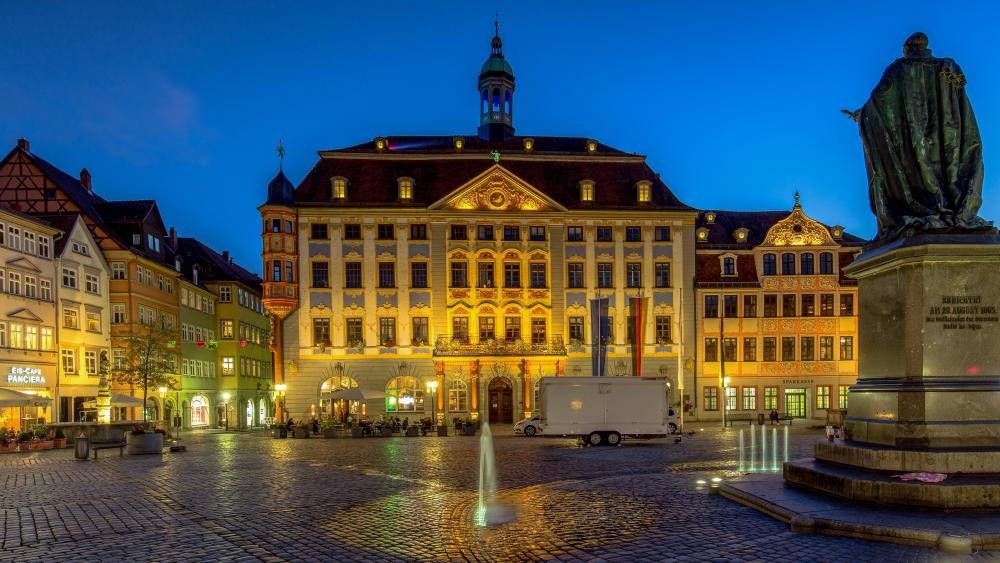
The Nazi’s have a day out
But were you at Coburg?
On 14th October 1922 Adolf Hitler led 800 members of the Sturmabteilung (SA) from Munich and other Bavarian cities by train to Coburg for a weekend rally. Once there, numerous pitched street battles with communists occurred. In the end, the final victory belonged to the Nazis. Later, the day was known as the Deutscher Tag in Coburg (German Day in Coburg). To have been there was an honour for any Nazi and would give them licence to brag for many years to come.
More than anywhere else in Germany, National Socialism took root in Coburg. As early as the mid 1920’s the Nazis became the dominant party in the city. It won the overall majority on June 23, 1929 with 43.1% of the vote, taking 13 of 25 city council seats, an absolute majority. On January 18, 1931 the Swastika flew for the first time in Germany on a public building, the Coburg Town Hall. On October 16 that year the city council elected Nazi Franz Schwede as First Mayor of Coburg, and on February 26, 1932, Coburg became the first German city to grant Hitler honorary citizenship . From 1939 Coburg was allowed to lead the honorary title
"First National Socialist City of Germany".
"Hitler and the Nazis ranked the importance of the Coburg venture so highly that to have been there became a special honor. This was officially recognized in 1932, when at the great festival on the 10th anniversary of that first victory, special badges were handed by Hitler to the men who had taken part."
" It is typical of Hitler's career that the Coburg episode, which started largely as a prank, ended as one of the most important milestones in Nazi history."- Kurt Luedecke
Read Adolf Hitlers account of the Nazis day out in Coburg, 14th October 1922
from Mein Kampf, Vol.I 1925
“‘Folkish’ associations planned to hold a so-called ‘ German Day’ in Coburg. I myself received an invitation to it, remarking that it would be desirable for me to bring an escort. This re¬ quest, which I received at eleven o’clock in the morning, came very opportunely. An hour later the arrangements for attending this ‘German Day’ had been issued. As an ‘escort’ I appointed eight hundred men of the SA; we arranged to transport them in approximately fourteen companies by special train to the little city that had become Bavarian. 1 Similar orders went out to National Socialist SA groups which had meanwhile been formed in other places.
It was the first time that such a special train was used in Germany. At all towns where new SA men got in, the transport aroused much attention. Many people had never seen our flags before; the impression they made was very great.
When we arrived at the Coburg station, we were received by a deputation of the organizers of the ‘ German Day,’ which conveyed to us an order from the local trade unions — in other words, from the Independent 1 and Communist Party — to the effect that we were forbidden to enter the town with flags un¬ furled, or with music (we had taken along a forty-two-piece band of our own), or to march in a solid column.
I at once flatly rejected these disgraceful conditions, and did not fail to express to the gentlemen present, the organizers of this congress, my surprise that they had carried on negotiations with these people and entered into agreements; I declared that the SA would immediately line up in companies and march into the city with resounding music and flags flying.
And that is just what happened.
On the square in front of the railroad station we were received by a howling, shrieking mob numbering thousands. ‘Murderers/ ‘bandits/ ‘robbers/ ‘criminals/ were the pet names which the model founders of the German Republic affectionately showered on us. The young SA kept exemplary order, the companies formed on the square in front of the station, and at first took no notice of the vulgar abuse. In the city that was strange to all of us, frightened police officials led the marching column, not, as arranged, to our quarters, a shooting gallery situated on the periphery of Coburg, but to the Hofbrauhauskeller, near the center of the city. To left and right of the procession, the uproar of the masses of people accompanying us increased more and more. Hardly had the last company turned into the courtyard of the Keller than great masses, amid deafening cries, tried to crowd in after us. To prevent this, the police locked the Keller. Since this state of affairs was intolerable, I had the SA line up once again, gave them a brief speech of admonition, and demanded that the police open the gates immediately. After a long hesitation, they yielded.
To get to our quarters, we marched back the way we had come, and now at last a stand had to be taken. After they had been unable to disturb the poise of our companies by cries and insulting shouts, the representatives of true socialism, equality, and fraternity had recourse to stones. At this our patience was at an end, and so for ten whole minutes a devastating hail fell from left and right, and a quarter of an hour later, there was nothing red to be seen in the streets.
In the evening there were serious clashes again. Some National Socialists had been assaulted singly, and patrols of the SA found them in a terrible condition. Thereupon we made short shrift of our foes. By next morning the Red terror, under which Coburg had suffered for years, had been broken.
With real Marxist-Jewish lies they now attempted to harry the ‘ comrades of the international proletariat ’ back into the streets, by totally twisting the facts and maintaining that our ‘ bands of murderers’ had begun a ‘war of extermination against peaceful workers’ in Coburg. The great ‘demonstration of the people,’ which, it was hoped, tens of thousands of workers from the whole vicinity would attend, was set for half-past one. Therefore, firmly resolved to dispose of the Red terror for good, I ordered the SA, which had meanwhile swollen to nearly one and a half thousand men, to line up, and set out with them on the march for the Fortress of Coburg, by way of the great square on which the Red demonstration was to take place. I wanted to see whether they would dare to molest us again. When we entered the square, only a few hundred were present instead of the announced ten. thousand, and at our approach they kept generally quiet, and some ran away. Only at a few points did Red troops, who had meanwhile come from the outside and who did not yet know us, try to pester us again; but in the twinkling of an eye, all their enthusiasm was spoiled. And now it could be seen how the frightened and intimidated population slowly woke up and took courage, and ventured to shout greetings at us, and in the evening as we were marching off broke into spontaneous cheering in many places.
At the station the railroad men suddenly informed us that they would not run the train. Thereupon I notified a few of the ring¬ leaders that in that case I planned to round up whatever Red bosses fell into my hands, and that we would run the train ourselves; however, we would take along a few dozen of the brothers of international solidarity on the locomotive and the tender and in every car. Nor did I fail to call it to the gentlemen’s attention that the trip with our own forces would, of course, be an extremely risky undertaking and that it was not excluded that the whole lot of us should break our necks and bones. But, anyway, in that case, we should be delighted to leave for the Hereafter, not alone but in equality and fraternity with the Red gentlemen.
Thereupon the train departed with the utmost punctuality, and we were back in Munich safe and sound the following morning.
Thus, for the first time since 1914 the equality of citizens be¬ fore the law was re-established in Coburg. For if today some simpleton of a higher official ventures the assertion that the state protects the lives of its citizens, this was certainly not the case at that time; for at that time the citizens had to defend them selves against the representatives of the present-day state.
At first the importance of this day could not be fully evaluated by its consequences. Not only that the victorious SA had been enormously enhanced in its self-confidence and its faith in the soundness of its leadership, but the outside world also began to follow our doings more closely, and many for the first time recognized in the National Socialist movement the institution which in all probability would some day be called upon to put a suitable end to the Marxist madness.
Only the democrats groaned that anyone could dare not peace¬ fully to let his skull be bashed in, and that under a ‘democratic’ republic we had had the audacity to oppose a brutal attack with fists and cudgels instead of pacifistic songs.
On the whole, the bourgeois press, as usual, was partly pitiful and partly contemptible, and only a few honest newspapers greeted the fact that in one place at least someone had dared to call a halt to the activity of the Marxist highwaymen.
In Coburg itself, at least a part of the Marxist working class, which incidentally could be regarded only as misled, had learned a lesson from the fists of National Socialist labor and been taught to realize that these workers also fight for ideals, since, as experience shows, men fight only for something that they believe in and love.
The greatest benefit, however, was derived by the SA itself. It now grew with great rapidity, and at the Party Day held on January 27, 1923, approximately six thousand men could take part in the dedication of the flag, and the first companies were fully equipped with their new uniforms.
For the experience in Coburg had shown how necessary it is, and not only in order to strengthen the esprit de corps, but also to avoid confusion and forestall mutual non-recognition, to introduce uniform dress among the SA. Until then it wore only the armband; now the canvas jacket and the well-known cap were added.
And, furthermore, the experience of Coburg had the significance that we now began systematically, in all places where for many years the Red terror had prevented any meeting of people with different ideas, to break this terror and restore freedom of assembly. From now on, National Socialist battalions were assembled again and again in such localities, and in Bavaria gradually one Red citadel after another fell a victim to National Socialist propaganda. The SA had grown more and more into its task, and so had moved further and further away from the character of a senseless and unimportant defense movement and risen to the level of a living organization of struggle for the erection of a new German state”.
Poster Advertising German day in Coburg.
Hitlers speech at 8pm in the Hofbräuhaus
Translated to English in the second picture.
Listen Hitlers account of the Nazi’s Day out in Coburg 14th October 1922
Hitlers recount of the Nazi day out in Coburg which if it didn't turn out well would have probably ended the party before it even really began.
Read or listen to Personal account by Kurt G.W Ludecke taken from his book “I Knew Hitler”
Ludecke was a very early member of the Nazi party and travelled with Hitler to Coburg, he also gives a great insight into the Characters of Dietrich Eckart and Alfred Rosenberg,
Karl Ludecke's account of the March on Coburg. Excellent character profiles of Eckart and Rosenberg "i knew Hitler" Coburg Germany - the first Nazi town
The rathaus (Town hall / City council office) in Coburg was the first official building in Germany to fly the Nazi flag on 18 January 1931. It was here in this marketplace that Hitler spoke before 10,000 people, including 1,300 holders of the Golden Party Badge during which he declared "With Coburg I made politics:"
A snippet of Hitlers speech
”At that time, our recipe was: if you do not want to let talk of your own accord, we will use force to make you do it. That battle of the force of reason versus the democracy of force lasted for two days, and after two days this reason, supported by the will of a thousand German men, came away with the victory! It was thus that the battle for this city became a milestone in the evolution of our Movement. This was the recipe we used throughout the Reich to clear the way for the National Socialist idea and thus to conquer Germany.
Loyalty and obedience, discipline and self-sacrifice: if the German Volk continues to devote itself to these ideals in the future as well, it will solve every problem and master every task!
Back then, millions might still have been able to doubt; yet who can continue today to doubt his Volk, Germany and its future? We old fighters, we know that we have always reached our goal until now! And in the future, Germany will reach its life-goal, too, for our Movement is Germany, and Germany is the National Socialist Movement”!
The rathaus (Town hall / City council office) in Coburg was the first official building in Germany to fly the Nazi flag
Coburg - The first Nazi town, the First town in Germany to fly the Swastika with its very own Nazi Mayor Franz Schwede
Following the Nazi seizure of power in January 1933, Schwede was directly appointed as Coburg's Lord Mayor (Oberbürgermeister). In March 1933, a terror campaign was launched under his leadership against Jews and opponents of the Nazis. By the end of April, 152 people had been arrested and harshly mistreated while in "protective custody", many in Schwede's presence. In 1939 Coburg was officially granted the title "First National Socialist City in Germany" (German: Erste nationalsozialistische Stadt Deutschlands). Schwede was also made an honorary citizen of Coburg, as Hitler had been, and was awarded use of the suffix "Coburg" in his name.
During his time in office Schwede ordered the evacuation of psychiatric hospitals and nursing homes in Treptow, Ueckermünde, Lauenburg, Meseritz-Obrawalde and Stralsund. Some 1400 patients were transported to Neustadt in Westpreußen to be shot by SS-Kommando Eimann or murdered by Sonderkommando Lange in gas vans. The mental sanitorium in Meseritz-Obrawalde then was converted into an Aktion T4 center and it is estimated that over 10,000 handicapped persons were killed there. The Director of the facility, Walter Grabowski, was appointed to his post by Schwede in November 1941. On 12 and 13 February 1940, the remaining 1,000 to 1,300 Pomeranian Jews, regardless of sex, age and health, were deported from Stettin and Schneidemühl to the Lublin-Lipowa Reservation which led to their ultimate demise.
On 13 May 1945, Schwede was captured by the British Army and once again ended up in custody as a prisoner of war. Interned until 1947, he underwent denazification procedures. He was tried for war crimes in a Bielefeld court and on 25 November 1948 sentenced to nine years in prison for membership in the SA-Führerkorps. On 7 April 1951 a court in Coburg sentenced him to another ten years' imprisonment on 52 counts of abuse of power and grievous bodily harm that he participated in during the terrors of March, 1933. His sentence was commuted to probation on 24 January 1956 on grounds of ill health and he died four years later at the age of 72 in Coburg.
“Coburg was the first city in Germany to be governed by National Socialism before 1933. Together with the SA, the NSDAP was able to test methods here that they would later implement throughout the Reich: völkisch communal ideology, rule by terror, ostracism of the Jewish population, attacks against dissidents.
We want the memory of the Jewish people who lived in Coburg to be preserved. The focus is on the remembrance of the victims of the Holocaust. But we also hope that our work will encourage further research into Coburg’s (Nazi) history and open up paths to an intercultural understanding of the present.”
Franz Reinhold Schwede (5 March 1888 – 19 October 1960) in his many guises - First Nazi Mayor
Coburg NSDAP
The Coburg branch office of the NSDAP pictured in 1937 on the 15th anniversary of its founding
86 Coburgers, including Franz Schwede, met In the club room, located in the rear of the The White Ross at Judengasse 36 (colour photo) on 24 October 1922 to form the Coburg local group of the NSDAP. The actual founding of the NSDAP local group followed on January 14, 1923. The first Coburg local group leader was the electrical engineer Riechers, who was soon replaced by his deputy, the chief inspector Heinrich Bergmann. At the same time, the Coburger SA was set up. From April 1, 1923, Franz Schwede, the determining person of the NSDAP in Coburg in the following years, was the local group leader. By June 1923, the NSDAP had about 200 members, in September there were at least 600 and soon moved to their new Branch Office (B&W photo). In time of course the vast majority of the town were NSDAP members.
Celebrations in Coburg
Hitler visited Coburg many times, usually around October each year to celebrate the taking of Coburg and it being the first Nazi town. He would speak in front of thousands before celebrations began in the square.
On October 15, 1937, Hitler, coming from Obersalzberg, was in the "dear, old Coburg", as he called the city, for the last time. The occasion was the 15th anniversary of Hitler's "Train to Koburg". On the market square, he spoke in front of 10,000 people, including 1,300 bearers of the Golden Party Badge. Among other things, he said: "I did politics with Coburg".
Hitler visited Coburg a total of fourteen times.
Pictures of the 15th anniversary of the march on Coburg
Coburg Coat of Arms
The late medieval city coat of arms, which depicts the head of Saint Maurice as a Moor, was replaced on 30 April 1934 according to a design by the Coburg graphic artist Franz Höch, based on the Koburg Medal of Honour, by a coat of arms with an SA dagger with a swastika in the pommel in a shield split from black and gold. The Lord Mayor Schwede wanted to use the forged dagger to emphasise the importance of the city for the early history of the Nazi movement. This has now obviously been returned to its original Moors Coat of arms with probably just as much controversy!
Watch what the Coburg locals thibk about their Cioat of Arms
The Old fighters get rewarded - the Coburg Medal
The Coburg Badge (or Das Coburger Abzeichen in German) was the first badge recognized as a national award of the Nazi Party.
Adolf Hitler ordered the Coburg Badge to be struck on 14 October 1932 to memorialize the event which took place ten years earlier, on Saturday, 14 October 1922.
Hitler had his first decisive victory, as it was to become Nazi folklore and led to the expression, in ardent Nazi circles, ‘But were you at Coburg?‘
The badge was declared an official party and national decoration in a decree signed by Hitler, on 6th November 1936, who had taken a personal interest in the design. Only 436 names were entered on the official party roll of recipients who were entitled to the badge.
The decoration of the veterans included a diploma signed by Adolf Hitler with the text:
"Der Inhaber dieser Urkunde Parteigenosse ... hat an dem Aufmarsch in Koburg am 14./15. October 1922 Ihm wurde anläßlich der Zehn-Jahres-Feier das Koburger Ehrenzeichen verliehen. München, im Oktober 1932". In English -
"The holder of this document, party comrade ... took part in the march in Koburg on 14/15 October 1922 He was awarded the Koburg Medal of Honour on the occasion of the ten-year celebration. Munich, October 1932".
On 1 August 1939, Reichsfuhrer-SS Heinrich Himmler decreed that any SS member (whether enlisted or officer) who wore the Coburg Badge was eligible to wear the Totenkopf ring.
The Coburg badge was also awarded as a badge of honor. One of these honorary bearers was the Nazi Charles Edward of Saxe-Coburg and Gotha. In 1938. One of the two known silver badges were posthumously given to a murdered SA man, Heinrich Bauschen from Duisburg. . Another silver badge was awarded to Therese Eßlinger from Munich. Martin Bormann is also mentioned as wearing a silver badge.
The Coburg Badge Medal Design
The award consists of an oval, slightly convex badge that was originally produced in massive bronze. It is 40mm wide and 54mm high, with a narrow wreath of laurel leaves around its edge measuring 2 mm across.
The badge features, in the obverse, a sword placed tip downward across the face of a swastika within an oval wreath of three leaves in each bunch and two berries at their tips. There are ten bunches on either side and the top two bunches on either side do not have the laurel berries. At the top of the wreath is Coburg Castle and village. The Castle has two spires on the viewer’s left with a large roofed building and a small adjacent pinnacle on the right. The wreath contains the words, “MIT HITLER IN COBURG 1922-1932″ (with Hitler in Coburg 1922-1932). Inside the wreath is a flat field that measures 4 mm, with a raised 0.5 mm line. The central oval void has a large swastika measuring 16 mm across and the width of the individual arms is 4 mm. From the top of the badge, superimposed over the castle and swastika is a double-edged sword with straight quillons, twisted grip handle and a pronounced ball pommel.
Watch the Coburg video from my trip May 2025
Then and Now Photos - Coburg Town hall Buildings, 1931, 1945 and 2025.
Coburg Castle 1922 and me in 2025.

















